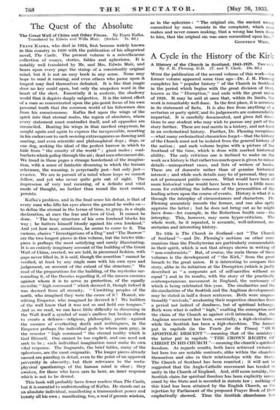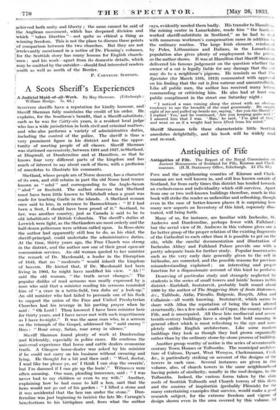A Cycle in the History of the Kirk
Wrra the publication of the second volume of this work—the former volume appeared some time ago—Dr. J. R. Fleming completes his " popular history " of the Church in. Scotland in the period which begins with the great division of 1843, known as the " Disruption," and ends with the great union of 1929. It may be said at once that, within its limits, the work is remarkably well done. In the first place, it is accurate in its statement of facts. It is also free from anything of a sectarian or party spirit; and its judgements are commendably impartial. It is carefully documented, and gives full direc- tions to any student who may wish to pursue any part of the story further. These are real merits in a history, and not least in an ecclesiastical history. Further, Dr. Fleming recognizes —what many ecclesiastical chroniclers forget—that the history of the Church must not be isolated from the general history of the nation ; and each volume begins with a picture of the Scotland of the time, which is done with marked historical ability. The only criticism one is inclined to make on the work as a history is that rather too much space is given to minor details unimportant cases, and lists of writers of books. These are of domestic rather than of genuine historical interest ; and while such details may be of personal, they arc not of permanent public concern. What would have been of more historical value would have been to leave a little more room for exhibiting the influence of the personalities of the leading actors upon the course of events. History is what it is through the interplay of circumstances and characters. Dr. Fleming accurately records the former, and can also aptly appraise the latter ; but he does not bring out as he might have done—for example, in the Robertson Smith case—the interplay. This, however, may seem hyper-criticism. The whole work, be it repeated, is accurate, well-informed, un- sectarian and interesting history.
Its title is The Church in Scotland—not " The Church of Scotland "—and Dr. Fleming's sections on other com- munions than the Presbyterian are particularly commendable in their spirit, which is not that always shown in writing of " non-conformists." But, of course, the main theme of these volumes is the development of " the Kirk," from the great breach to the great union. It is interesting to compare this story, alike in its initiation at the Disruption (which is justly described as " a corporate act of self-sacrifice without an equal ") and in its results, with the story of the practically contemporaneous movement in England, the centenary of which is being celebrated this year. The similarities and the dis-similarities' of the Scottish and the Anglican developments may be stated in half a dozen sentences. • Both were unques- tionably "revivals," awakening their respective churches from a period not indeed of deadness, but of spiritual lethargy. Both were what is called " high," exalting the conception and the claim of the Church as against civil intrusion. But, the Anglican movement has been, essentially, a high-eleriealism ; while the Scottish has been a high-ehurchism. The former put in capitals (in the Tracts for the Times) " OUR APOSTOLIC DESCENT "—meaning that of the ministry ; the latter put in capitals " THE CROWN RIGHTS OF CHRIST IN HIS CHURCH "—meaning the church's spiritual freedom. As regards results, both have achieved victories ; but here too are notable contrasts, alike within the churches themselves and also in their relationships with the State. The Church of Scotland has been reunited ; it will not he suggested that the Anglo-Catholic movement has tended to unity in the Church of England. And, still more notably, the Scottish claim for spiritual freedom has been explicitly recog- nized by the State and is recorded in statute law ; nothing of this kind has been attained by the English Church, as the rejection by Parliament of the proposed Prayer Book of 192$ emphatically showed. Thus the Scottish chureluzian has
achieved both unity and liberty ; the same cannot be said of the Anglican movement, which 'has deepened _ division and which " takes liberties "—not quite so ethical a thing as winning freedom. This is not the place to discuss these points
''irrelevantly comparison between the two churches. But they are not 'Irrelevantly mentioned in a notice of Dr. Fleming's volumes, itfor the Scottish story has many lessons for English church- ! men ; and his work—apart from its domestic details, which may be omitted by the outsider—should find interested readers south as well as north of the Border.
P. CARNEGIE SIMPSON.

















































 Previous page
Previous page